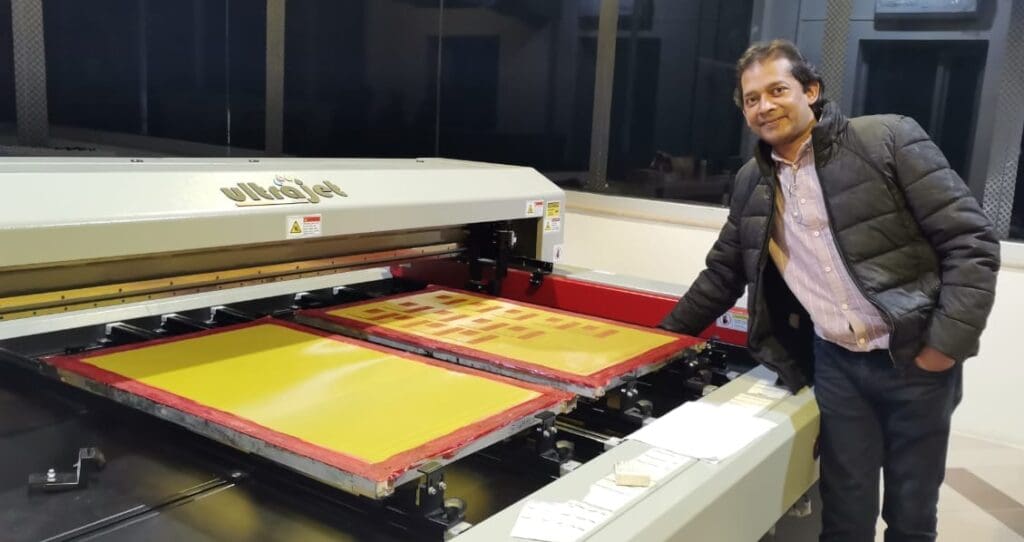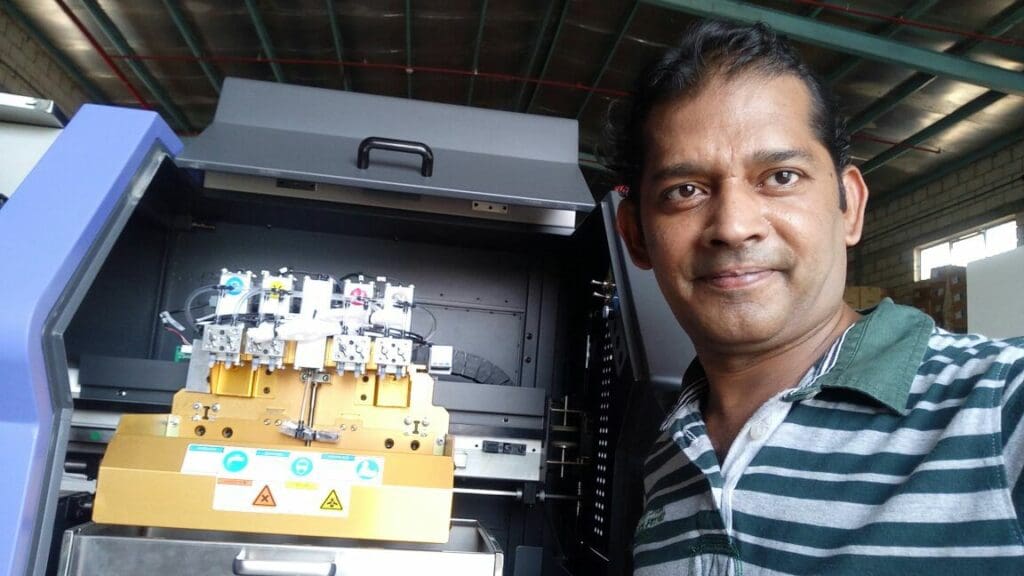Digital Printing Engineer working as Head of Technical Support
Navid Raza has experience as a Technical Support and Digital Printing Engineer working on the world’s leading brands of large and small format digital printers. He is now head of Technical Support for AUZ International. Navid is based in Pakistan.
Here, he shares his experience and typical day.
Life of Head of Technical Support for Digital Printing Engineering – meet Navid Raza


Background and path to becoming an Engineer
Were you interested in engineering as a child?
Never, to be honest.
I always wanted to become a writer or author. I studied English literature but then changed to Electronics and graduated in that subject.
What led you to be most interested in Electronic Engineering?
There were two things.
Firstly, a year’s certification in electronics.
Secondly, I started to work as an assistant in an advertising company. I realised that things were easy for me when it came to understanding electronics and mechanisms.
Who have been inspirations or mentors to you?
There have been four main mentors in my working life.
Patrino Basco from AGFA
Farid Sabri from the Sabri Group of Industries
Nazar Ur Rehman from 3M
Arjen Evertse from Mimaki.
Typical Day as Head of Support of Digital Printing Engineering
What’s your typical day like?
As I am a technical guy, it’s always hectic.
My day includes:
Dealing with zoom meetings
Finalising products according to the market
Contacting clients to have their feedback about installed machines
Maintaining records of their output
etc
How much of your time is spent ‘in the field’ – working as an engineer?
About 40 % of my time is out in the field. This is because I help clients to help themselves when machines are installed. I train them the best I can by rectifying problem either on phone or via emails. If the case is severe then I visit them to sort out the problem.
How much of your day is spent on admin and other things?
I never know. It all depends on the situation. I handle any job-related administration (technical). In addition, I help the Sales Director or Marketing guy to support them by providing the best knowledge. Sometimes I visit clients with them to answer the clients’ technical questions.


Training
You are also involved in training. What are you tips for explaining technical issues in a clear and simple way?
Yes, I am and it’s a good and essential part of my job.
Whenever a machine is installed, I conduct training sessions for the operators.
How I do this, all depends on the person and how technical they are. I can’t share nand gates, nor gates, block diagrams and schematics with the operator. However, if the operator has a bit of a technical background, then I do share according to their skill level.
Types of equipment used as an engineer in digital printing
What sort of printers do you work on?
I work on the following printers:
Digital printers roll to roll
Flatbed
Direct to film and direct to fabric (with eco solvent, sublimation and reactive inks)
What is the most interesting/best designed printer you work on or have worked on?
Mimaki, Roland and Mutoh in small format.
Jeti, Agfa and HP are the best I have come across.
What do you think is in the future for printers?
I think the sky is the limit for the future of printers. The future will see more growth as static advertisements won’t ever be obsolete.


Most challenging part of the job as a digital print engineer
What do you find most challenging about the work?
There are two challenging areas – technical and customers.
Technical challenges happen when I’m handling a printer without any provided training.
Challenges with customers are when they can’t follow the written guidelines and don’t understand the basics of operation. I also find it challenging when the operators think that the machine is at fault rather than that they have caused the problem.
What has been your most difficult job so far?
It happened recently, when the engineer from Grunig didn’t arrive on site because he had Covid. So, I was asked to install the Grunig Stretching Machine. The call came from the client with these words:
“Navid, come over, you can do it.”
To be honest I didn’t even know the size of the machine.
However, it ended well, because with the help of online technical support, the machine was installed before the deadline.
Making a winner
What sort of person makes an excellent Field Service Engineer?
I think the key thing is to focus on the job and not to let unwanted things enter our minds. Then to just get the job done because to see someone working on the problem or issue calms everything around when the client is in full panic mode.
How important is it to stay uptodate with other products not just the ones you work on?
It is almost impossible to win a war without being equipped, talking about the product knowledge and training. No update about any product is wasted. I avoid handling giants without training.
How important is ongoing training?
I think without training, you can’t do the job. Simple.
Mentors
How key is it to have a mentor and a good team around you?
None of us are masters, we always need a mentor when it comes to learning.
To me, the technical managers of every product, are my mentors and sometimes an operator too.
I don’t mind consulting about things I don’t know. It helps me not to create another fault.
New field service engineers
What advice would you give to someone who has just started their first job:
During their first month?
A best listener can always be the best learner. Listen first and then raise your hand to talk about questions and to gain further information.
During their first three months?
Always difficult because we all need a little time to understand the atmosphere of the company and colleagues’ behaviour. So, work silently, mind your own business, let your actions speak for you.
Apart from a strong technical background, what are the three most important skills to have?
I feel that the three most important skills to have are:
Communication
Passing on technical knowledge
Sharing and doing as much as you can to help
In short, I don’t work for my company, I work to satisfy myself by giving my best. If I do my best, my company will grow.


Equipment further reading
Dipankar Mondal servicing airport security systems
A US Navy veteran who installs and services baking production line equipment for Kaak North America


Responses